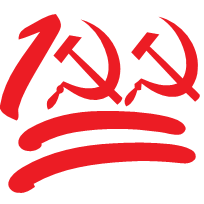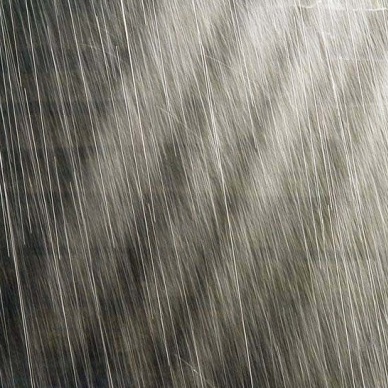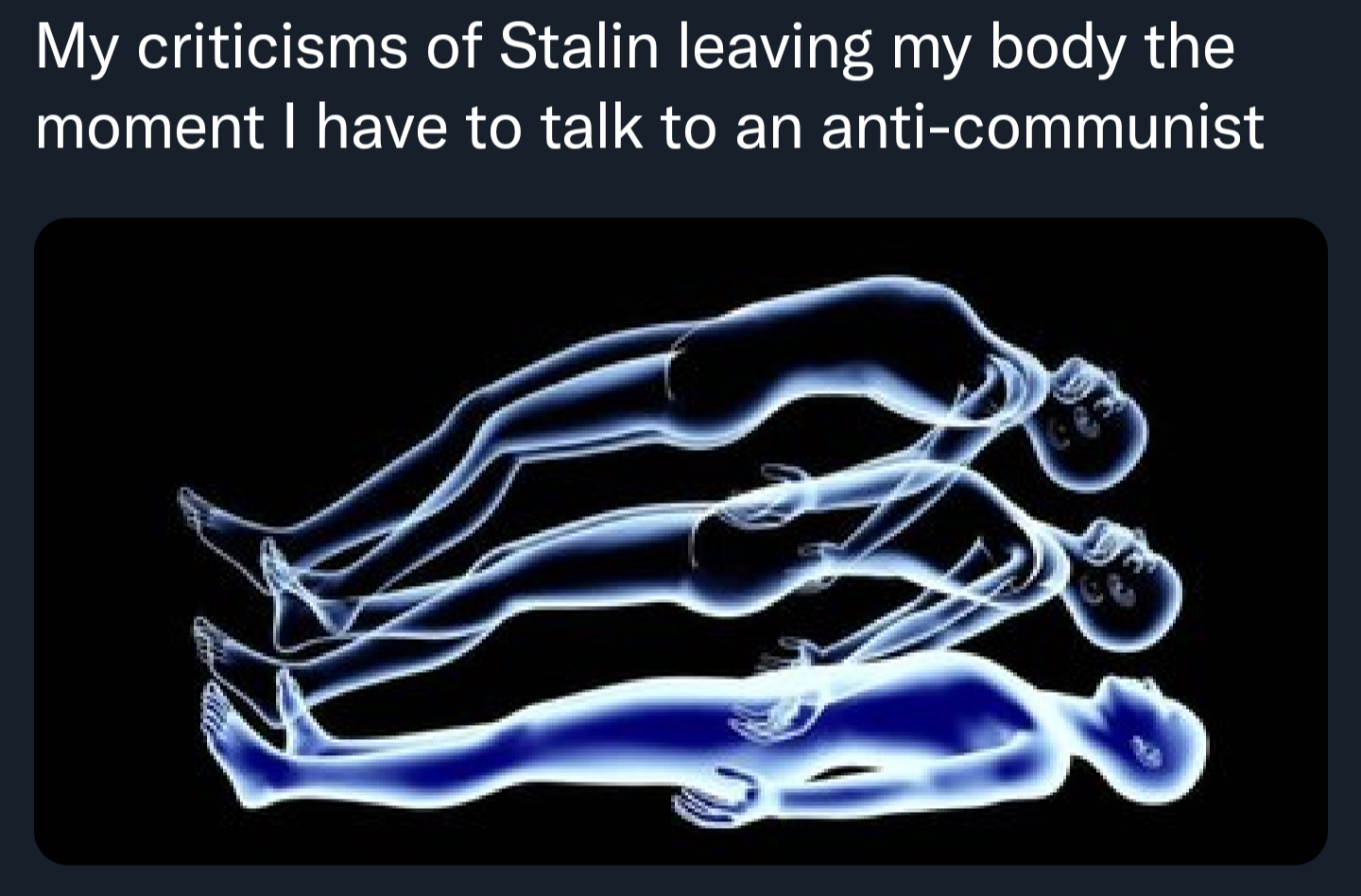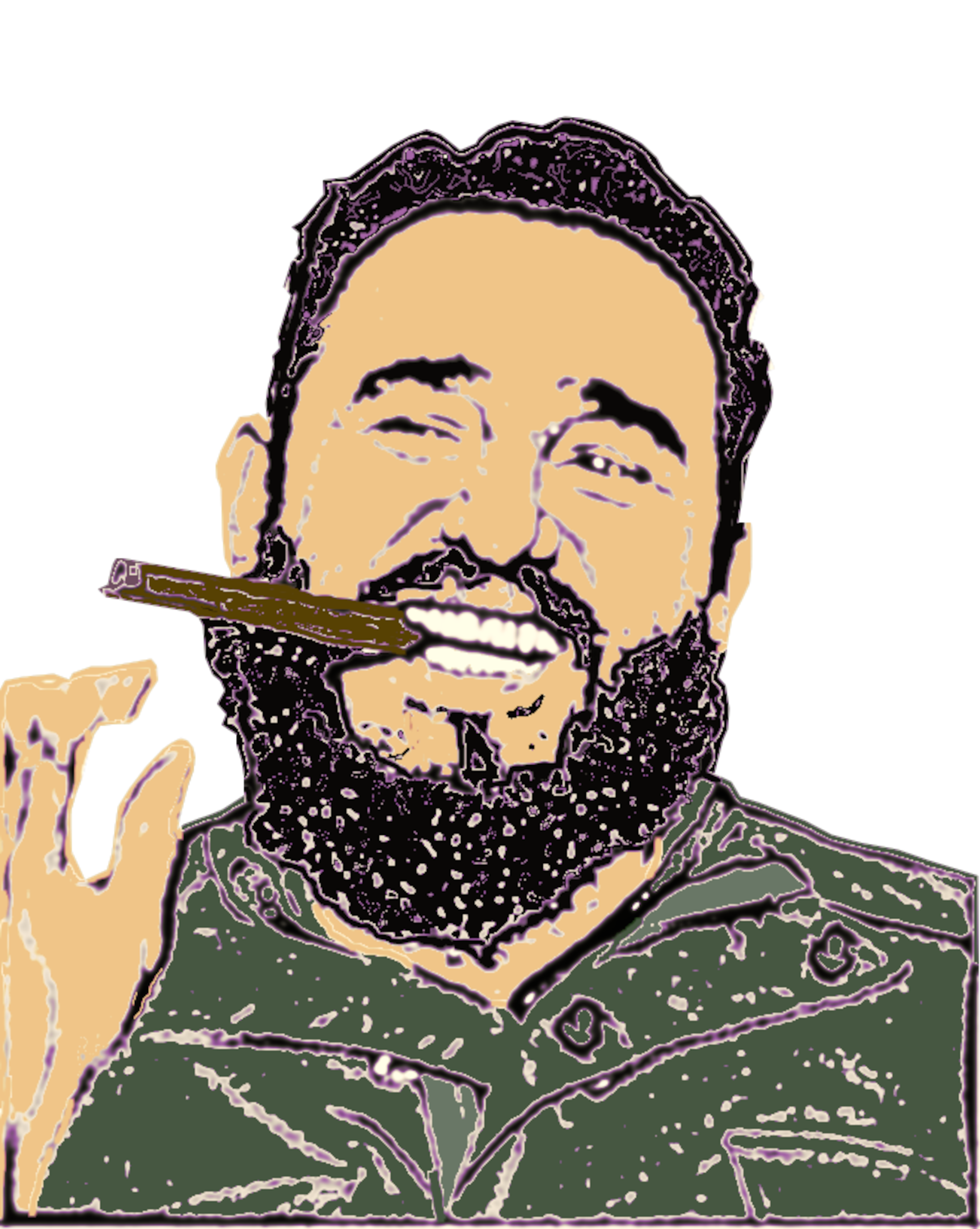- cross-posted to:
- memes@lemmy.ml
- memes@lemmygrad.ml
- cross-posted to:
- memes@lemmy.ml
- memes@lemmygrad.ml
Me talking about stalin with other marxists: he did lots of good, did some bad, we should evaluate his actions and make sure to not repeat them, while keeping the actions that enabled numerous successes. *lists multiple fuckups stalin did with the chinese civilwar, tito-stalin split, homosexuality ban, etc)
Me when talking to Liberals about stalin: Stalin is my father and leader
It really feels like there’s a point where amerikkkan propaganda destroys history and I think we’ve reached that with Stalin
Said the guy in part famous for exporting all the bread there was in Ukraine to other parts of his empire.
Yeah, that’s definitely what happened lol
Well then you tell me what did, I’m intrested to hear “both sides of the story”.
Ok here’s what happened: Nazis made propaganda to discredit their enemies and you believed that propaganda. Then you went on a website and showed everyone there what an idiot you are, not just because you believe the propaganda and take it as the default, but also because what you’re asking for someone else to explain to you has already been discussed at length in this same thread.
Alright let’s say I know that, now what is it that made the people die in Ukraine?
A famine in a region where regular famines occurred every 5 years or so for the last 500 years. Avoidable, had mistakes not been made by central planning in that they trusted what kulaks were reporting as their grain figures and yields when the reality was that they were hoarding for private profit while reporting false figures. This error in oversight meant fields were assigned under yield and not enough was produced. Upon discovering this error was occurring it was swiftly and harshly stamped on by the deployment of the red army to seize hoarded grain, hoarders were executed.
It was the last famine the region ever had after hundreds of years of regular famines, with errors in the system being stamped out simply by having extra checks on numbers instead of trusting the farms in future.
It also did not solely occur in Ukraine. It occurred across the Soviet Union, heavily affecting Poland and Kazakh too, but is not the subject of a persistent campaign to label it genocide propaganda there by literal actual nazis spreading the double genocide myth.
This indeed sounds intresting, I might look into it. In the meantime thank you for your answer.
The primary thing to keep in mind here is that nobody denies that a famine occurred. The region was plagued with them for hundreds of years and the socialists were implementing a new method of production that was ultimately experimental and without any historic precedent from which to learn from. The mistakes that were made in its implementation did lead to an avoidable famine had those mistakes not been made. The question at hand is truly just whether this famine was intentional or not. Very little evidence for its intent exists, both in the soviet archives and in any outside evidence.
I strongly recommend reading the Preface to the Revised Edition of The Years of Hunger: Soviet Agriculture, 1931-1933 by RW Davies and Wheatcroft, two extremely well regarded academic historians. It is a good insight into how this was regarded as absurd by academia, and has been manufactured for political purposes over time. I will quote some of this preface below:
PREFACE TO REVISED EDITION
Since this book was completed, the Soviet famine of 1931–33 has become an international political issue. Following a number of preliminary declarations and a vigorous campaign among Ukrainians in Canada, in November 2006 a bill approved by the Ukrainian parliament (Verkhovna rada) stated that the famine was ‘an act of genocide against the Ukrainian people’. In the following year a three-day event commemorating the famine in Ukraine was held in its capital, Kiev, and at the same time Yushchenko, the president, called on the Ukrainian parliament to approve ‘a new law criminalising Holodomor denial’ – so far without success.1 Then on May 28, 2008, the Canadian parliament passed a bill that recognised the Holodomor as a genocide and established a Ukrainian Famine and Genocide (‘Holodomor’) Memorial Day. Later in the year, on October 23, 2008, the European parliament, without committing itself to the view of the Ukrainian and Canadian parliament that the famine was an act of genocide, declared it was ‘cynically and cruelly planned by Stalin’s regime in order to force through the Soviet Union’s policy of collectivization of agriculture’. In the following month, on the 75th anniversary of what it described as ‘the famine-genocide in Ukraine’, the Ukrainian Canadian Congress held a widely publicised National Holodomor Awareness Week.
This campaign is reinforced by extremely high estimates of Ukrainian deaths from famine. On November 7, 2003, a statement to the United Nations General Assembly by 25 member-countries declared that ‘the Great Famine of 1932–1933 in Ukraine (Holodomor) took from 7 million to 10 million innocent lives’. According to Yushchenko, Ukraine ‘lost about ten million people as a direct result of the Holodomor-genocide’. The President of the Ukrainian World Congress insisted in a statement to the United Nations that ‘a seven–ten million estimate appears to present an accurate picture of the number of deaths suffered by the Ukrainian nation from the Great Famine (Holodomor) of 1932–33’.2 In contrast, the Russian government has consistently objected to the Ukrainian view. On April 2, 2008, a statement was approved by the Russian State Duma declaring that there was no evidence that the 1933 famine was an act of genocide against the Ukrainian people. The statement condemned the Soviet regime’s ‘disregard for the lives of people in the attainment of economic and political goals’, but also declared that ‘there is no historic evidence that the famine was organized on ethnic grounds’. The official view was endorsed by the Russian archives, and by Russian historians. In 2009 the Russian Federal Archive Agency published a large handsome book reproducing photographically 188 documents from the archives, to be followed by several further volumes.3 In the preface the director of the Russian archives, V. P. Kozlov, criticises the ‘politicisation’ of the famine:
Not even one document has been found confirming the concept of a ‘golodomor-genocide’ in Ukraine, nor even a hint in the documents of ethnic motives for what happened, in Ukraine and elsewhere. Absolutely the whole mass of documents testify that the main enemy of Soviet power at that time was not an enemy based on ethnicity, but an enemy based on class.4
In our own work we, like V. P. Kozlov, have found no evidence that the Soviet authorities undertook a programme of genocide against Ukraine. It is also certain that the statements by Ukrainian politicians and publicists about the deaths from famine in Ukraine are greatly exaggerated. A prominent Ukrainian historian, Stanislas Kul’chitskii, estimated deaths from famine in Ukraine at 3–3.5 million;5 and Ukrainian demographers estimate that excess deaths in Ukraine in the whole period 1926–39 (most of them during the famine) amounted to 31⁄2 million.6 Nevertheless, Ukrainian organisations continue, with some success, to urge Canadian schools to teach as a fact that excess deaths were 10 million during the 1932–33 famine.7 This does not mean that Ukraine did not suffer greatly during the famine. It is certainly the case that most of the famine deaths took place in Ukraine, and that the grain collection campaign was associated with the reversal of the previous policy of Ukrainisation.8 In this context Russian interpretations of the famine differ greatly. At one extreme doughty supporters of the Stalinist regime claim that the famine was an act of nature for which Stalin and the Soviet government were not responsible. Thus in his recent book on the famine a Russian publicist, a certain Sigizmund Mironin, argued that the very poor harvest of 1932 was the main cause of the famine:
Using the articles of M.Tauger and other English-language sources, I seek to prove: 1) there was a very bad harvest in 1932, which led to the famine; 2) the bad harvest was caused by an unusual combination of causes, among which drought played a minimum role, the main role was played by plant diseases, unusually widespread pests, and the lack of grain connected with the drought of 1931, and rain during the sowing and harvesting; 3) the bad harvest led to a severe famine … 4) the Soviet leadership, and Stalin in particular, did not succeed in receiving information about the scale of the famine; 5) Stalin and the Politburo, as a result of the drought in 1931, did not have grain stocks, but did everything they could to reduce human losses from the famine, and took every measure to prevent famine from recurring.9
This view of the famine is emphatically and justifiably rejected by most Russian historians. We show in the following pages that there were two bad harvests in 1931 and 1932, largely but not wholly a result of natural conditions. But the 1932 harvest was not as bad as Mark Tauger has concluded (see pp. xix–xx below). Stalin was certainly fully informed about the scale of the famine. Moreover, Mironin’s account neglects the obvious fact that the famine was also to a considerable extent a result of the previous actions of Stalin and the Soviet leadership. Mironin’s book is Stalinist apologetics, not history. Unfortunately this approach to the Stalin era is increasingly publicised in contemporary Russia.
there’s a moment on the journey out of liberalism where you finally read Stalin’s words and go, “wait, this is the guy they’re saying all that wild shit about?”
https://redsails.org/stalin-and-ludwig/
https://redsails.org/stalin-and-wells/Stalin: You exaggerate. We have no especially high esteem for everything American, but we do respect the efficiency that the Americans display in everything in industry, in technology, in literature and in life. We never forget that the U.S.A. is a capitalist country. But among the Americans there are many people who are mentally and physically healthy who are healthy in their whole approach to work, to the job on hand. That efficiency, that simplicity, strikes a responsive chord in our hearts. Despite the fact that America is a highly developed capitalist country, the habits prevailing in its industry, the practices existing in productive processes, have an element of democracy about them, which cannot be said of the old European capitalist countries, where the haughty spirit of the feudal aristocracy is still alive.
…
That cannot be said of America, which is a country of “free colonists,” without landlords and without aristocrats. Hence the sound and comparatively simple habits in American productive life. Our business executives of working-class origin who have visited America at once noted this trait. They relate, not without a certain agreeable surprise, that on a production job in America it is difficult to distinguish an engineer from a worker by outward appearance. That pleases them, of course.

Stalin Ameriboo confirmed
Stalin did nothing wrong. Except stopping at Berlin.
its true, generally good guy that made great strides for lgbtq folks
Thats one of the things he generally did bad on, but he did massively improve the qol of impoverished queer folks, and improved the qol of queer folks in liberated territories.
saying that someone who recriminalised homosexuality did nothing wrong ‘because he improved the general quality of life’ sounds suspiciously like queer folk just being the cost of doing business
Yes Stalin was homophobic. He deserves criticism for this. Welcome to most people and countries (especially the Christian ones). I find it incredible that despite the fucking travesty that is the quality of life for queer folk in the USA, especially for black; indigenous; non-white peoples, certain folk have the gall to look back at a man born over 100 years ago, son to a poor family in a nation under the boot of Russian Empire and criticize him for not having perfect values when the common narrative of him as a monster is disrupted. Of course he wasn’t perfect, of course he deserves criticism where criticism is due. However, there are a significant set of actions which deserve praise, especially relative to his common depiction.
That being said, it’s not as if socialist governments that do well when it comes to queer rights are lauded for their efforts. The DDR made significant strides for the queer community yet is rarely (if ever) applauded in the west for this. Cuba still manages to get attacked on this front despite having the most progressive stance on the matter today. This criticism in this context never feels in good faith, it feels desperate and reaching for a way to conflate socialists and fascists.
Welcome to most people and countries (especially the Christian ones).|
I find it incredible that despite the fucking travesty that is the quality of life for queer folk in the USA
i wasn’t comparing stalins policies to other countries, people or the USA, i was commenting on ‘stalin did nothing wrong’
certain folk have the gall to look back at a man born over 100 years ago, son to a poor family in a nation under the boot of Russian Empire and criticize him for not having perfect values when the common narrative of him as a monster is disrupted
i wasnt commenting on him not being a monster, i was commenting on ‘stalin did nothing wrong’
That being said, it’s not as if socialist governments that do well when it comes to queer rights are lauded for their efforts. The DDR made significant strides for the queer community yet is rarely (if ever) applauded in the west for this. Cuba still manages to get attacked on this front despite having the most progressive stance on the matter today. This criticism in this context never feels in good faith, it feels desperate and reaching for a way to conflate socialists and fascists.
i wasnt commenting on socialists or their policies, i was commenting on ‘stalin did nothing wrong’
Removed by mod
i didnt figure it was until folks actually defended it seemingly completely genuinely
you can tell because “its true, generally good guy that made great strides for lgbtq folks” is actually also not an extremely serious statement
This criticism in this context never feels in good faith, it feels desperate and reaching for a way to conflate socialists and fascists.
If they hate him, it means he must have the right idea.
TBF liberals hate fascists, just significantly less than they hate communists.
A lot of liberals will actively support fascists if it means beating the evil leftists
nah, they hate the imagery of nazis (high school history and emergence of basic political ability), they don’t really know enough of what fascism is to hate it in any other form.
Ukraine comes to mind
 they hate us. That hate will lead them to cheer on fascists.
they hate us. That hate will lead them to cheer on fascists.Ukraine has shown that liberals will actively cheer on fascists as soon as somebody gives them permission to do so.
folks if you look below the post topic, but right above the comment box, you’ll see
cross-posted to: memes@lemmygrad.ml memes@lemmy.ml
if you click one of them you’ll go to the cross-posted post where you have the opportunity to respectfully engage with users whom may not know about the discussions we’ve had here.
Ah, so you are the guys sending in the political memes to memes@lemmy.ml now I’m not that suprised by the number of them anymore.
Lmao shut up nerd
He is also quoted as saying
Death solves all problems. No man, no problem.
True, Stalin was a more nuanced character that he is usually given credit for but he was still a paranoid and brutal man who was responsible for the deaths of a lot of innocent people.
Let’s not fall into the trap of either lionizing or demonizing historical figures.
Don’t you find it a little strange that this short bit of quote is so often repeated but we never hear the context for it?
When you hear it out of context it sounds callous and cruel, but it would be a very different statement if (for example) he said it in response to finding out Hitler killed himself or that some enemy had died of cancer or something.
And that’s not even taking into account the fact that it’s inherently very suspicious that nobody seems to be able to produce a source for the original context and attribution of the quote.
Whether the quote is aprocyphal or not, it seems fitting because of the way Stalin dealt with political opponents. The list of early Bolsheviks were rounded up and shot during Stalin’s purges is quite lengthy.
Let me just pop on my They Live sunglasses and give this post a reread
whether it’s true doesn’t matter because it fits my opinion of him
Whether the quote is aprocyphal or not, it seems fitting
 holy shit I love liberals
holy shit I love liberalsnew site tagline just dropped
He is also quoted as saying [blahblahblahbollocksbollocksbollocks]
No he isn’t. Maybe you should actually verify instead of spreading complete and utter bullshit with such confidence?
Let’s not fall into the trap of either lionizing or demonizing historical figures.
Yet here we are, with you attempting to demonise a historic figure by spreading bullshit.
responsible for the deaths of a lot of innocent people.
Every single US president in world history is too. Every single supporter of capitalism is responsible for 100million deaths every 5 years, what’s your point? You’re making an emotional attempt to demonise in one breath while pretending otherwise in the next.
You’re full of shit mate.
If you read my comment properly, I specifically said “he is quoted as saying …”, which is undeniably true.
Yet here we are, with you attempting to demonise a historic figure by spreading bullshit.
Saying that that Stalin was a brutal and paranoid man, amongst other things is a historically accurate statement.
If you think I’m promoting the standard, one dimensionals view that Stalin was evil incarnate, then you have completely failed to understand my point.
He is quoted as saying something he didn’t say. It is undeniably true that words where put in his mouth
I think we get your point
If you read my comment properly, I specifically said “he is quoted as saying …”, which is undeniably true.
Oh fuck off. Weasel words. How fucking slimey are you?
Saying that that Stalin was a brutal and paranoid man, amongst other things is a historically accurate statement.
Stalin was a soft kind grandpa compared to Lenin.
I like how the people actively pursuing plots against Stalin then also criticize him for being paranoid. I would be paranoid too if all of the richest people and institutions in the world were organizing nazi collaborator opposition against me.
like his best friend was killed by foreign agents, who wouldn’t be paranoid to hell?

















